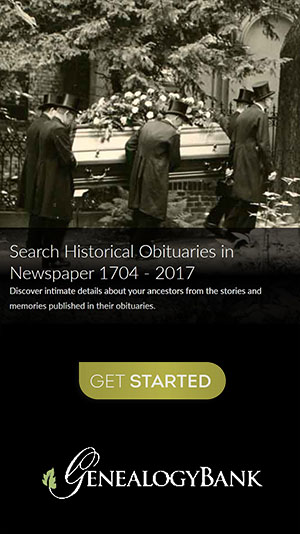Search Death Records (United States)
 U.S. Newspapers, 50 State Full Search (1690-present)
U.S. Newspapers, 50 State Full Search (1690-present) U.S. Obituary Database Search, (1696-present)
U.S. Obituary Database Search, (1696-present) U.S. Birth Announcements Database, (1700s-present)
U.S. Birth Announcements Database, (1700s-present)
Gathering Information
The more you know about the decedent you are searching for, the easier it will be to locate. Most people know a lot more about a person than they think.
Consider the following:
- Where and when the decedent died
- Where the decedent spent most of their life
- Where the decedent's family were buried
- Did the decedent have any family or friends?
- The decedent's religion
- Was the decedent retired from military service?
- The decedent's financial status
Where and when the decedent died
These are the most useful pieces of information in finding an interment. More people are buried or cremated within the area they died. The date of death is important for narrowing your search.
Resources for finding the place and date of death include:
Where the decedent spent most of their life
People often want to be buried where they spent most of their lives. To these people, this is the place where they feel "home" is, and is often where many of their relatives live.
Resources for finding the place where the decedent spent most of their life include:
Where the decedent's family were buried
People want to buried where they will be remembered, and this is often where their other family members are buried. Finding out where a decedent's family is buried, is not easy, and there are no specific resources that give you this information directly. If you don't already know this, you may need to contact someone related to the decedent.
Did the decedent have any family or friends?
If no one comes forward to claim a body, the coroner will deliver the body to a local funeral home for burial. Costs of the burial are paid for using the decedent's personal belongings. If there is not enough funds to cover the burial, the county picks up the tab. Each state establishes its own laws on how these bodies are handled. Most states require the bodies to be buried, in the event any family claims the body at a later date. In some states, unclaimed bodies are incinerated.
Contact the coroner in the county of where the decedent died to find out what happened to the body. In all states, all deaths must be reported to the coroner.
The decedent's religion
Some cemeteries are available only to individuals of a specific religion. People often wish to be interred at a cemetery of their own faith. Knowing the person's religion may clue you in to locating cemeteries of a specific religion.
Cemeteries that begin with "Saint" or "St." are often Catholic cemeteries. Cemeteries that have religious references in their names often are associated with a particular faith: "Ascension", "Holy", "Resurrection", etc.
In the old days, and even today in rural areas, churches maintained a cemetery on or near the church grounds. Knowing which church the decedent attended can clue you in to a particular cemetery or faith.
Was the decedent retired from military service?
Retired military personnel are eligible for free burials at a national cemetery. Quite often, these people elect to be buried there for economical reasons and for pride. One must serve at least 20 years in the military in order to be eligible for "retired status". Each large city has at least one national cemetery.
The National Cemetery Administration is responsible for operating the cemeteries in the national cemetery system. Their website provides a list of the cemeteries with addresses and phone numbers, as well as information on how to obtain military records.
The decedent's financial status
Families with little money often bury their dead in public cemeteries. Public cemeteries offer burials at nominal cost. These cemeteries are operated by "cemetery districts", which are under the jurisdiction of a city, county, or parish government. A cemetery district usually has two or three cemeteries in operation, and these cemeteries are usually among the oldest operating cemeteries in the area. These cemeteries are often named after the geographic region they are located in: "Anaheim Cemetery".
Most cemetery districts actually have their own websites, as they are government agencies. Piper Resources has an excellent resource of state and county websites called, "State and Local Government on the Net". Locate the county website, and from their locate a list of county agencies.
Conversely, wealthy families tend to bury their dead in privately owned and operated cemeteries, where they can purchase enough land to buffer themselves from other graves, build mausoleums, and erect monuments. These cemeteries usually have picturesque names such as "Shady Oaks Glen", or "Lilac Hills".
Search Interment.net
Submit a Transcription
Help genealogists worldwide research their family history!
- No cost to publish your transcription- You retain all rights to your work
- No one can edit, change, or delete your work

